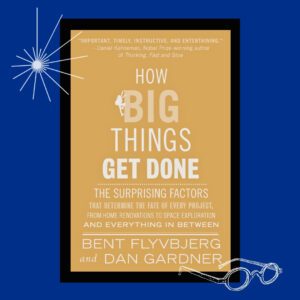Editor’s Note: As we bid farewell to 2023 and welcome the new year, we asked our colleagues to name some of their favorite books they read this year. The following list is a mix of genres and publication dates; all of the books explore fascinating ideas that inspire awe and wonder.

A Woman of Firsts: The True Story of the Midwife Who Built a Hospital and Changed the World, by Edna Adan Ismail
This is a riveting first-person account of how Edna Adan Ismail revolutionized female healthcare and education in her homeland, which earned her many honors, including the 2023 Templeton Prize. I highly recommend listening to the audio book, read by Edna, to fully understand how a little girl with a big dream achieved what few thought was possible.
–Heather Templeton Dill, President
 Stolen Focus: Why You Can’t Pay Attention, by Johann Hari
Stolen Focus: Why You Can’t Pay Attention, by Johann Hari
The more I listen, the more important I think it is for people to read Stolen Focus. I’m not anti-tech, but as a consumer and a parent, it is important to know how these new technologies are designed to monopolize your attention. As someone who relies on focus for assessing and developing new grant opportunities, I also need to be mindful of how much time is wasted when I toggle between tasks!
–Sarah Clement, Senior Director, Character Virtue Development
 Wanting: The Power of Mimetic Desire in Everyday Life, by Luke Burgis
Wanting: The Power of Mimetic Desire in Everyday Life, by Luke Burgis
As the father of three young sons, I’ve wondered how my own passions and desires influence my sons’ passions and desires. From my 1-year-old’s longing for my iPhone to my older boys’ passion for the Philadelphia Eagles, it appears as if my enthusiasm and attention influences their enthusiasm and attention. In this book, Burgis (also a Templeton Ideas contributor) draws on the works of French philosopher Rene Girard to describe how we often mirror the desires of those around us. This work has enabled me to reflect more deeply on my own desires – what do I want, and why? How do I orient my desires towards those ends that will bring me – and those around me – the greatest fulfillment? As a grant maker in character development, my hope is to support programs that not only help people do good, but to desire to do the good as well.
–Rich Bollinger, Senior Program Officer, Character Virtue Development
 Surrender: 40 Songs, 1 Story, by Bono
Surrender: 40 Songs, 1 Story, by Bono
My favorite book I read this year was Bono’s autobiography. I enjoyed it for several reasons that I didn’t necessarily expect. As a long-term and passionate fan of U2, I certainly enjoyed hearing the story behind certain songs and the history of the band. Given their longevity, I often feel they have been the soundtrack to my life, as I can easily recall certain parts of my life (both good and bad) when I hear certain songs.
What I didn’t expect to connect with was his often-long discussions of his philanthropic work: his theological and spiritual reflections, the challenges of working across political and social boundaries, and his growing awareness about how easily philanthropy can appear as “white saviorism”, especially in places like Africa. These are all things they often weigh on my mind as a grant maker, and it was perhaps comforting to know that even mega-rockstars like Bono still grapple with many of the same challenges.
–Erik Gjesfjeld, Program Officer, Religion, Science, & Society
 Shop Class as Soulcraft: An Inquiry into the Value of Work, by Matthew Crawford
Shop Class as Soulcraft: An Inquiry into the Value of Work, by Matthew Crawford
Crawford targets the existential malaise of so many “knowledge workers” and urges us to reconsider the nature of meaningful work and the value of creatively engaging the material world with our physical bodies. This is a compelling book because Crawford uses his philosophical expertise to unpack and analyze both white-collar jobs and manual labor, highlighting what we lose when we buffer ourselves from the material world.
–Sarah Lane Ritchie, Program Officer, Philosophy & Theology
 Supernova Era, by Cixin Liu
Supernova Era, by Cixin Liu
This novel by Cixin Liu, author of The Three-Body Problem, is a fascinating thought experiment. Supernova Era bears some resemblances to Lord of the Flies, but it contains fresh, brilliant insights that I had never considered. For instance, if human society were entirely composed of and led by children, one would need to view all facets of life through the lens of play. It’s a completely different mindset, one that would lead to different choices and a different reality.
–Thomas Burnett, Assistant Director, Communications
 Remembrance of Things Past, by Marcel Proust
Remembrance of Things Past, by Marcel Proust
The best book I read in 2023 is one I am sure I will not finish until deep into 2024. It is the third and fourth volume of Proust’s Remembrance of Things Past.
Contrary to every assumption, Proust is funny, self-mocking, transcendently observant, and clear. The sentences are complex, yes, but they have a rhythm that carries you beautifully once you learn to feel the music of his prose. Proust has a knack for the social observation that makes you say, “Aha! Yes, that is exactly what happens every Thanksgiving!” The only difference is that his eye is trained on the nobility of turn-of-the-century Paris, a world removed from us by many steps, but made fresh and alive as the everyday experiences of 2023.
Choose any volume of the book – any page – and start reading. I’m certain if you give him a minute to carry you along, you’ll be grateful to spend time with this strange, delightful man, who spent much of his life in bed, with cork-paneled walls, immersed in silence and the act of recording and fictionalizing his beautiful memory.
–Ben Carlson, Director, Strategic Communication
 Tocqueville in Arabia: Dilemmas in a Democratic Age, by Joshua Mitchell
Tocqueville in Arabia: Dilemmas in a Democratic Age, by Joshua Mitchell
This book is an examination of the application of Toqueville’s writing in the modern era through a comparative lens. Mitchell draws on his experiences teaching college students at Georgetown University and at Georgetown’s campus in Doha, Qatar to explore Toqueville’s thinking on the individual, society, and the relationship between the two.
–David Nassar, Vice President, Strategic Engagement
 Small Things Like These, Claire Keegan
Small Things Like These, Claire Keegan
A compact story about moral courage and institutional decay. Keegan doesn’t waste any words. I read it on a quick flight in the summer, and it has stayed with me ever since.
–John Cunningham, Director, Public Engagement
 Stella Maris, by Cormac McCarthy
Stella Maris, by Cormac McCarthy
Stella Maris focuses on an extremely rational but troubled and bereft person who is visited by spiritual beings who (she insists) cannot be dismissed as imaginary. It made a strong impression on me, and it felt Templetonian in certain ways.
–Matt Walhout, Chief Programs Officer
 Planta Sapiens: The New Science of Plant Intelligence, by Paco Calvo
Planta Sapiens: The New Science of Plant Intelligence, by Paco Calvo
Planta Sapiens provides a glimpse into diverse plant phenomena that are “agential,” or at least goal-oriented. A similar one I read was Brilliant Green, by Stefano Mancuso, as well as his larger book, The Revolutionary Genius of Plants. These are good introductions for those who are interested in the incredible and neglected capacities of plants.
–Kevin Arnold, Director, Life Sciences
 Piranesi by Susanna Clarke
Piranesi by Susanna Clarke
A whimsical story about wandering through a labyrinthine house, and also a dramatic mystery about murder, kidnapping and a crisis of personal identity. The narrator is naïve and endearing, and leaves you asking questions about what’s worth valuing in your everyday life.
–Redmond Brubaker, Executive Assistant, Office of the President
 How Big Things Get Done, by Bent Flyvbjerg and Dan Gardner
How Big Things Get Done, by Bent Flyvbjerg and Dan Gardner
Lots of interesting and sometimes surprising insights into why some projects become very successful and others fail. Even better is that much of the advice is practical and applicable to projects big and small.
–Amy Proulx, Director, Individual Freedom & Free Markets
 The Running Grave, by Robert Galbraith
The Running Grave, by Robert Galbraith
The Running Grave is J.K. Rowling’s seventh book in the “Cormoran Strike Novel Series,” written under the pen name Robert Galbraith. The Strike series chronicles the trials of two main characters: Cormoran Strike, the bruised and gruff, yet wise and empathic, private investigator, and Robin Ellacourt, his clever and courageous, yet somewhat green, colleague. This novel revolves around extracting a young man from the grips of a fledgling religious cult, and as Cormoran and Robin delve deeper into their efforts, their discoveries about the cult and its practices become increasingly more disturbing.
Despite the familiarity of the basic plot, Rowling has a knack for sneaking in alluring elements and surprises that enhance her stories. Moreover, in almost all of Rowling’s writings, I simply enjoy getting lost in the worlds she creates while learning more about her characters’ virtues and flaws. The setting of London, with its dark alleys, winding streets, rainy skies, and imposing buildings, adds to the gothic mood of the proceedings.
–Greg Wolcott, Program Officer, Individual Freedom & Free Markets
